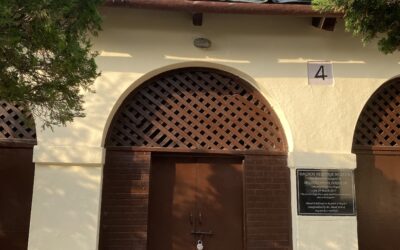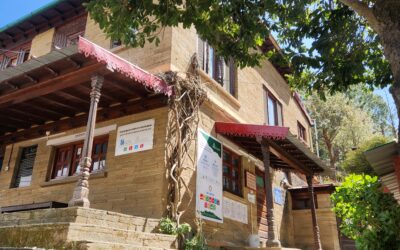The better part of my day here in Kantain, Uttar Pradesh comes after school hours. There is immense satisfaction in helping some extremely eager students with academics as well as general awareness about the world around them. The sun sets as the children of Mishirpur read books in a circle and ask, “Ma’amji, aur ek kitaab dedijiye?” in their shrill yet innocent voices.
It took me two months to reach this stage. There were several issues that I faced and some that I still face. There were quite a few apprehensions as well. Before delving straight into the challenges, I would like to share my initial idea of a community library. I had envisioned it as a space where anyone from the community, in this case, a village, can come anytime to read, discuss and learn. There would be qualitative discussions based on newspaper reports, children reading up story books, youth involving themselves in novels as well as videos of skill-building. This way, all of them would learn from each other. Little did I know, this was to change after a week’s interaction with the community.
The first challenge for me, was the level of illiteracy. While informally interacting with some women of the village, I realized that most of them do not know how to read and write, even in their mother tongue, Hindi. Many children still don’t go to school. Their parents do not push them enough, and even the children don’t seem to like it. The men who are literate, mostly go out of the village to work, and return late in the evening.
For a week, when I thought of conducting a literacy program, women had chores to attend. Some said that they would send their children because the nearby government school was not doing a good job in educating their children. There were some who agreed without much hassle. Implementing a mass adult literacy program needs resources but here, people would not buy their own pens and notebooks.
This changed my entire idea of a community library here. I started thinking more on the lines of holding reading sessions including activities like monthly village newsletter and video stories. There are other issues like shortage of power supply which meant that we would have to stop as soon as it gets dark. With winters, the days have become shorter and hence, there is lesser time for such sessions.
The importance of education is questionable for majority of people in this village. They are unaware of the opportunities that education can provide. Most of them are farmers or laborers on others’ farms. To them, those professions look like viable sources of livelihood for their children as well. There is a general sense that higher education is not necessary for a better future.
The oppressive caste structure also became a hindrance in my work. For these sessions, I chose to work at the aanganwaadi of the village, which comes in that section where people from higher castes do not reside. Initially, such families were reluctant to send their children. Even today, except three of them, everyone belongs to the lower caste.
Then there were a set of unrealistic expectations from the community. Some women thought that I would teach their children in a way that they won’t have to go to the school. A few high school students believed that I would help them in their preparation of several entrance examinations. Several of them left with dismayed faces when they got to know that I only had story books and novels to offer.
When I came to know that I will be working to create a mobile library, I had a lot of ideas. However, when I visited families and groups of people, to interact with them, I realized that my ideas do not hold much value among these people. Where reading and writing is a huge roadblock, discussing news comes late. I had difficulties with lowering down my expectations and modifying the results I’d want to see.
Despite all this, my first day at mobile library, which began with a reading session, was indeed satisfactory. Ten children turned up. Most of them were impatient, in a rush to finish one book so that they could go on to the next one. There was one kid who was smiling throughout. When I asked him if anything seems comical, he said, “Nahi ma’am. Achha lag raha hai, aisa pehle kabhi hua nahin na, isiliye.”




The last line reminded me of that scene from 3 idiots.
Lovely to hear of your experiences! Great going… Keep up the good work!
I could able to visualize my childhood through you. Good going……..